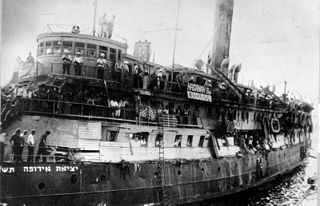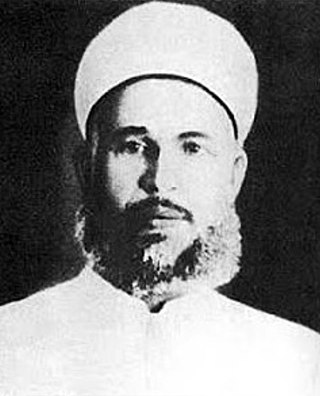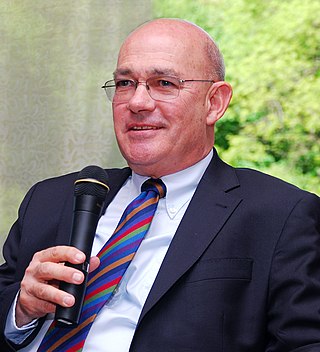
David Ben-Gurion was the primary national founder of the State of Israel as well as its first prime minister. As head of the Jewish Agency from 1935, and later president of the Jewish Agency Executive, he was the de facto leader of the Jewish community in Palestine, and largely led the movement for an independent Jewish state in Mandatory Palestine.

A homeland for the Jewish people is an idea rooted in Jewish history, religion, and culture. The Jewish aspiration to return to Zion, generally associated with divine redemption, has suffused Jewish religious thought since the destruction of the First Temple and the Babylonian exile.

A popular uprising by Palestinian Arabs in Mandatory Palestine against the British administration of the Palestine Mandate, later known as the Great Revolt, the Great Palestinian Revolt, or the Palestinian Revolution, lasted from 1936 until 1939. The movement sought independence from British colonial rule and the end of the British authorities' support for Zionism, which sought the establishment of a Jewish state in Palestine by means of mass migration and displacement of the local Arab population.

The 1920 Nebi Musa riots or 1920 Jerusalem riots took place in British-controlled part of Occupied Enemy Territory Administration between Sunday, 4 April, and Wednesday, 7 April 1920 in and around the Old City of Jerusalem. Five Jews were killed and several hundred injured; four Arabs were killed, and eighteen injured; 7 Britons were injured. The riots coincided with and are named after the Nebi Musa festival, which was held every year on Easter Sunday, and followed rising tensions in Arab–Jewish relations. The events came shortly after the Battle of Tel Hai and the increasing pressure on Arab nationalists in Syria in the course of the Franco-Syrian War.

ʿIzz ad-Dīn ibn Abd al-Qāder ibn Mustafā ibn Yūsuf ibn Muhammad al-Qassām was a Syrian Muslim preacher, and a leader in the local struggles against British and French Mandatory rule in the Levant, and a militant opponent of Zionism in the 1920s and 1930s.

Musa Kazim Pasha al-Husayni held a series of senior posts in the Ottoman administration. He belonged to the prominent al-Husayni family and was mayor of Jerusalem (1918–1920). He was dismissed as mayor by the British authorities and became head of the nationalist Executive Committee of the Palestine Arab Congress from 1922 until 1934. His death was believed to have been caused by injuries received during an anti-British demonstration.
The Palestinian people are an ethnonational group with family origins in the region of Palestine. Since 1964, they have been referred to as Palestinians, but before that they were usually referred to as Palestinian Arabs. During the period of the British Mandate, the term Palestinian was also used to describe the Jewish community living in Palestine.

The Hebron massacre was the killing of sixty-seven or sixty-nine Jews on 24 August 1929 in Hebron, then part of Mandatory Palestine, by Arabs incited to violence by rumors that Jews were planning to seize control of the Temple Mount in Jerusalem. The event also left scores seriously wounded or maimed. Jewish homes were pillaged and synagogues were ransacked. Some of the 435 Jews in Hebron who survived were hidden by local Arab families, although the extent of this phenomenon is debated. Soon after, all Hebron's Jews were evacuated by the British authorities. Many returned in 1931, but almost all were evacuated at the outbreak of the 1936–39 Arab revolt in Palestine. The massacre formed part of the 1929 Palestine riots, in which a total of 133 Jews and 110 Arabs were killed, the majority of the latter by British police and military, and brought the centuries-old Jewish presence in Hebron to an end.

Yalo was a Palestinian Arab village located 13 kilometres southeast of Ramla. Identified by Edward Robinson as the ancient Canaanite and Israelite city of Aijalon. During the Middle Ages, it was the site of a Crusader castle, Castrum Arnaldi.

Jabel Mukaber is a predominantly Palestinian neighborhood in southern East Jerusalem. It is bordered by East Talpiot to the west, Abu Tor and Silwan to the north and Sur Baher to the south. Jabel Mukaber has a population of approximately 30,000 (2017).

The Pro–Wailing Wall Committee was established in Mandatory Palestine on 24 July 1929, by Joseph Klausner, professor of modern Hebrew literature at the Hebrew University of Jerusalem, to promote Jewish rights at the Western Wall.

The Battalion of the Defenders of the Language was a small but militant body established by Jewish students at the Herzliya Hebrew Gymnasium in Tel Aviv in the 1920s to urge Jews in then Mandatory Palestine to use only the Hebrew language.

Events in the year 1929 in the British Mandate of Palestine.

The Battle of Tel Hai was fought on 1 March 1920 between Arab and Jewish forces at the village of Tel Hai in Northern Galilee. In the course of the event, a Shiite Arab militia, accompanied by Bedouin from a nearby village, attacked the Jewish agricultural locality of Tel Hai. In the aftermath of the battle eight Jews and five Arabs were killed. Joseph Trumpeldor, the commander of Jewish defenders of Tel Hai, was shot in the hand and stomach, and died while being evacuated to Kfar Giladi that evening. Tel Hai was eventually abandoned by the Jews and burned by the Arab militia.
In 1918, following the British defeat of the Ottoman army and their establishment of a Military Government in Palestine, a number of political clubs called Muslim-Christian Associations were established in all the major towns. They soon formed a national body, the Palestine Arab Congress, which tried to influence the developing British policy in Palestine and counter the influence of the Zionist Commission which visited Palestine in April 1918. The main platform of these groups were:

Mandatory Palestine was a geopolitical entity that existed between 1920 and 1948 in the region of Palestine under the terms of the League of Nations Mandate for Palestine.

The Mandatory Palestine national football team, also known as the Eretz Israel national football team, represented the British Mandate of Palestine in international football competitions, and was managed by the Palestine Football Association.

Tom Segev is an Israeli historian, author and journalist. He is associated with Israel's New Historians, a group challenging many of the country's traditional narratives.

The Arab Higher Committee or the Higher National Committee was the central political organ of Palestinian Arabs in Mandatory Palestine. It was established on 25 April 1936, on the initiative of Haj Amin al-Husayni, the Grand Mufti of Jerusalem, and comprised the leaders of Palestinian Arab clans and political parties under the mufti's chairmanship. The committee was outlawed by the British Mandatory administration in September 1937 after the assassination of a British official.















